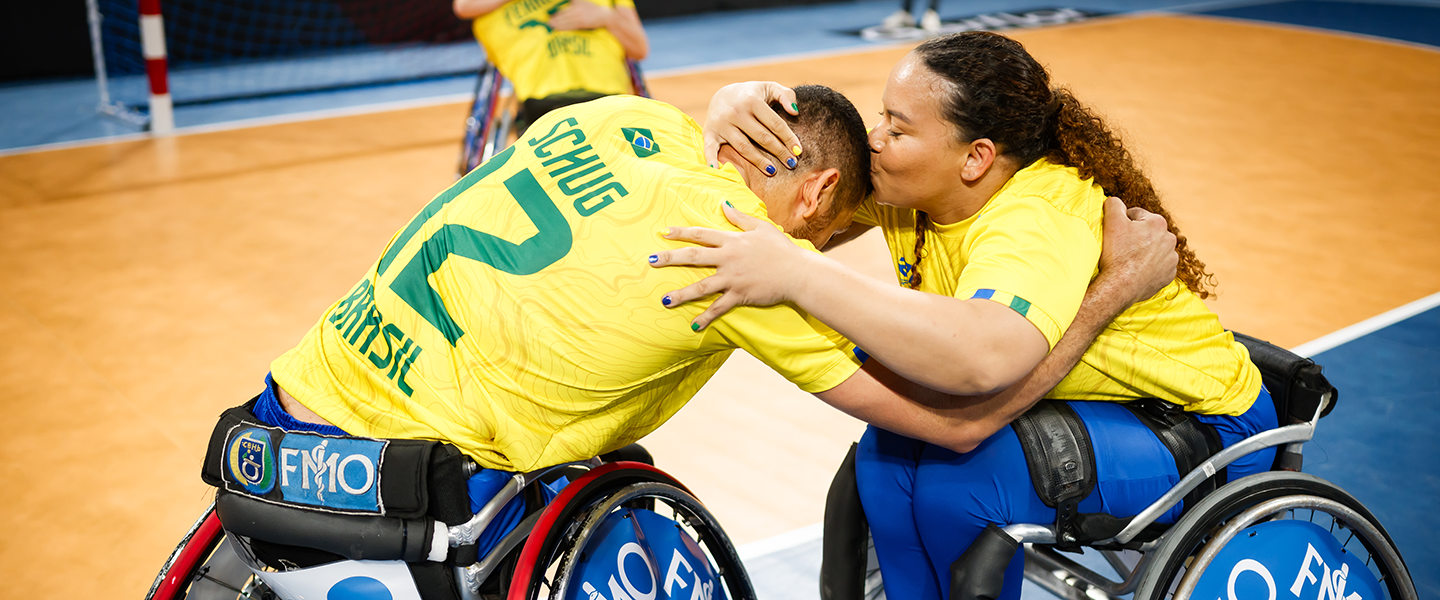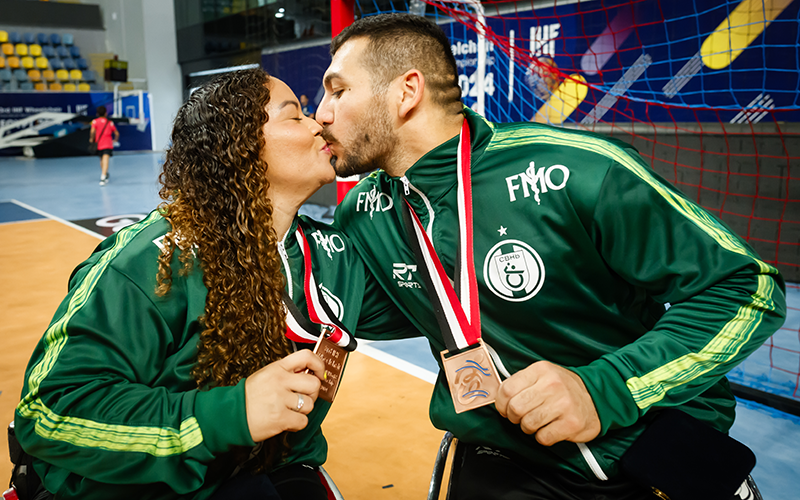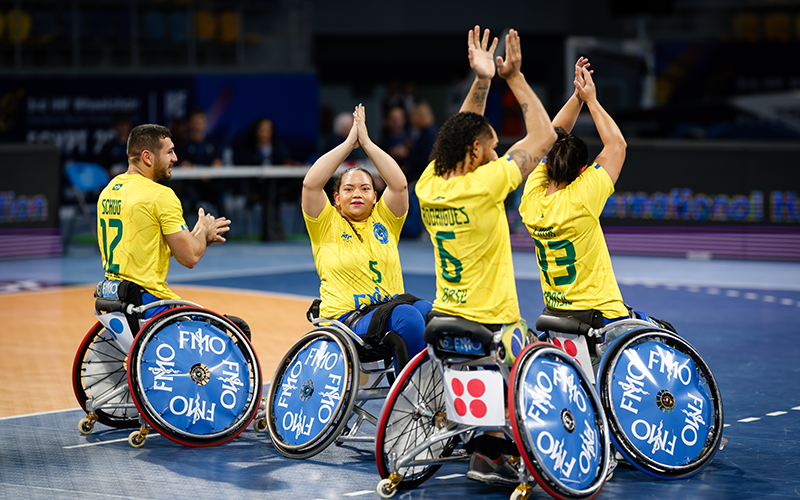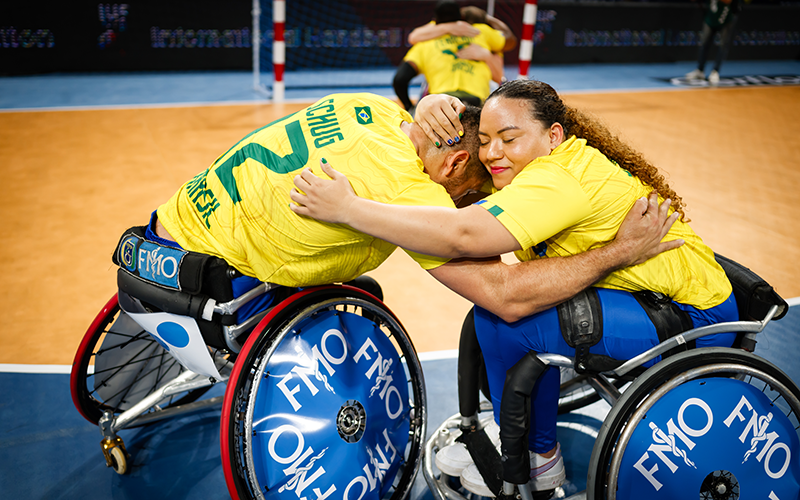"It was our love for handball which brought us together"
18 Jul. 2025

From July 12 to 18, fans, players, and communities across the globe will unite for seven unforgettable days dedicated to the sport’s rich history, vibrant present, and promising future. The International Handball Week is here and we are focusing on all disciplines of the sport, higlighting some fantastic stories throughout the handball world. Today, we focus on Shirley Januário and Dione Nunes Schug, who found love after playing together for the Brazil wheelchair handball national team.
What’s more beautiful than love? Probably nothing. And when handball unites destinies, the result is even more fulfilling—a proof that sport can ignite not just careers, but lifelong bonds.
We have seen time and time again that handball is more than a sport: it is a conduit for love, resilience, and the forging of remarkable bonds. On the court, stories unfold that are not just about goals scored, but about transformed lives and relationships that blossom against all odds.
There’s a unique magic when two people are brought together by a shared passion, especially when it’s forged on the court. The story of Shirlei and Dione is a testament to how sport, especially wheelchair handball, can become the stage for both personal triumph and the blossoming of true companionship.
Both Shirley Januário and Dione Nunes Schug have represented Brazil at the 2024 IHF Wheelchair Handball World Championship. They did everything they could to bring more glory to their nation, securing the bronze medal in a highly-contested competition.
Yet wheelchair handball is always more to them than a simple sport.
“I never imagined I’d get this far, it was a feeling of euphoria and disbelief all at once. Reaching the top is a dream come true for us athletes. I was so happy to go twice to the World Championship. It’s always a feeling of gratitude to everyone who helped make this dream a reality,” says Januário.
In 2022, at the first edition of the IHF Wheelchair Handball World Championship, Brazil struck gold, with a fantastic performance, confirming their credentials as one of the top teams in the world, with wheelchair handball being played for decades in the South American country.

“Hearing the anthem at the World Championship brings feeling of gratitude and happiness for making a dream come true. Every time, I think about everything I went through, all the sadness and obstacles, and how it was all worth it,” adds Januário.
“It was always a childhood dream to wear the national team jersey. I always try to give my best. I feel fulfilled showing this to my hometown, and everyone feels very proud of me. When I came back from Egypt, there was even a huge celebration in the city streets and I was really happy with such a tribute,” says Nunes Schug.
Yet it was not easy. At first, it was more, more difficult than both could ever imagine.
“I learnt about handball through Professor Samuel Macena. It was incredible to discover this discipline—until then, I had only played wheelchair basketball. After my injury, I became very depressed and sedentary, and by medical recommendation I started and got to know the sport during my rehabilitation at Sarah Hospital,” says Januario.
“I had already been playing wheelchair basketball since 2012, which I discovered at Sarah Kubitschek Hospital, and I participated in several tournaments in that sport. Then, in 2016, I met Professor Samuel at CEPID—he was substituting for another teacher temporarily. He introduced us to handball, and right away I was curious and eager to learn more about it. He decided to form a team, and since I could no longer juggle both sports, I decided to stick with handball.”
For Schug, it was even more difficult.
“Before sports, I wasn’t really living—I had no expectations for life. I didn't see myself doing anything anymore in my small hometown, where people live off agriculture. Since I couldn’t do what I used to, like taking care of cattle or farming, I thought I’d never be happy again, but today I see that all of that has changed,” says the Brazilian player.
And through handball, she met the love of her life, another wheelchair handball player, Dione Nunes Schug, who also represented Brazil at the 2024 IHF Wheelchair Handball World Championship.
“I met Dione during a national team training session in Rio do Oeste,and immediately admired him for being such an incredible, focused, and determined athlete. Never did I imagine that years later we’d be representing the same team, and it was during the first Brazilian Championship in 2023 that we grew closer. So really, it was our love for handball that brought us together. He and I have the same purpose, and whenever one of us feels demotivated, the other pushes us to continue and never give up,” adds Januário.
It was a turning point for both of them, as their relationship grew stronger and stronger and meant that they could rely on each other.

“I met her in handball and this love only grows every day. There were several moments when I thought about quitting and focusing on just one sport because of offers from other teams that only train basketball. But the love I feel for her and for the sport keeps me here to this day,” confirms Nunes Schug.
From that moment on, life would never be the same for Dione and Shirley, as both had the other to count on, to rely upon and to motivate when feeling down.
“We’re always reminding each other how strong we are. He knows all my insecurities and everything I’ve gone through as an athlete, and always reminds me of my strength when I feel like giving up. I always tell him he’s the best handball player. We constantly remind ourselves how passionate we are about the sport, always respecting each other’s limitations on the court, avoiding pointing out mistakes, and instead helping each other improve—always with empathy and love, which is what we feel for each other,” says Januário.
Schug agrees immediately. “She motivates me every day; I can say that I am a better person with her by my side. I know her insecurities and difficulties, and she knows mine, so we help each other become better people and better athletes.”
Wheelchair handball helped Shirley Januario in every aspect of her life, creating a new purpose and a new motivation.
“It’s given me a better quality of life, both financially and personally. It opened doors, and today I have a degree thanks to the visibility that handball and athletics brought to my life. Recently, I got my own sports chair, which had been a dream for many years—I’m very happy and fulfilled, and I feel valued as an athlete,” adds the Brazil player.
But she keeps on dreaming. They keep on dreaming.

“My dream is to represent the Brazilian national handball team exclusively in the women’s category. I really believe it will happen one day, and that will be a huge achievement for us women. In the meantime, I’ll keep working to improve and perfect my skills,” says Januario.
“One of my goals was to be the best in wheelchair handball in Brazil, and I achieved that at the 2023 Brazilian Handball Championship. I really want to represent the national team and compete in other world events again. In the meantime, I will keep improving my skills, especially at my new position as goalkeeper,” adds Schug.
Wheelchair handball shows that sport can be more than a game—it’s a space where lives change, dreams are realized, and hearts find one another. For Shirlei and Dione, every training and every competition is not only about athletic achievement, but about the deep, enduring fulfillment that only love—and handball—can deliver.

